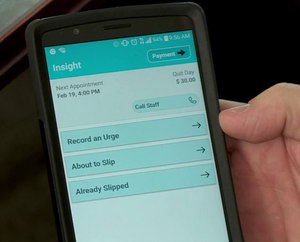
The Link2Care smartphone app funded by NIH will allow homeless people to connect to case management services to keep them healthier and safer.
Link2Care, a new smartphone application , is being developed for homeless people who were recently incarcerated to keep them connected to case managers and other local resources.
Developed by a scientist from the Oklahoma Tobacco Research Center (OTRC) at the Stephenson Cancer Center, and funded by a $3.3 million grant from the National Institutes of Health (NIH) , the app is being designed to improve health outcomes for homeless adults.
The aim of the Link2Care app is to increase the use of already available case management services, and thereby, help homeless adults to reduce alcohol use, drug use, psychological distress, and ultimately reduce homeless nights and re-arrest,” said Michael Businelle, PhD, a lead investigator on the project.
The app is being developed by the OTRC’s Mobile Health (mHealth) Shared Resource, which works to create technology solutions to help identify and assist populations at risk.
When using the app, individuals can connect to a case manager, as well as crisis management resources.
Many people see cell phones as a luxury, and something not often associated with homeless people, but cell phones are one of the most necessary items for people without a permanent address. Without access to a phone, individuals cannot receive calls about job openings, medical information or follow-up with law enforcement.
There are a number of organizations that offer free or reduced-price cell phones to low-income and homeless individuals, such as Google and Community Technology Alliance’s Mobile4All project , led by manager Allan Baez.
Smartphones are incomparable tools for connecting people who are isolated, and empowering homeless and extreme-low-income individuals to access life-changing services and gain self-sufficiency,” Baez said in an interview with The Guardian .
A basic cell phone can be extremely cost efficient and allow calls and text messages to be made cheaply, while smartphones can access free Wi-Fi or hotspots for Internet needs.
A 2011 study published in the Journal of Urban Health found that 62 percent of homeless youth own a cell phone, and 65 percent were using the phone to find a way off the street.
With the new Link2Care app, they will have one more way to get the help they need. According to NIH , a clinical trial will involve more than 400 participants and will run through 2022.
Copyright © 2026 GovGrantsHelp.com. All rights reserved.
